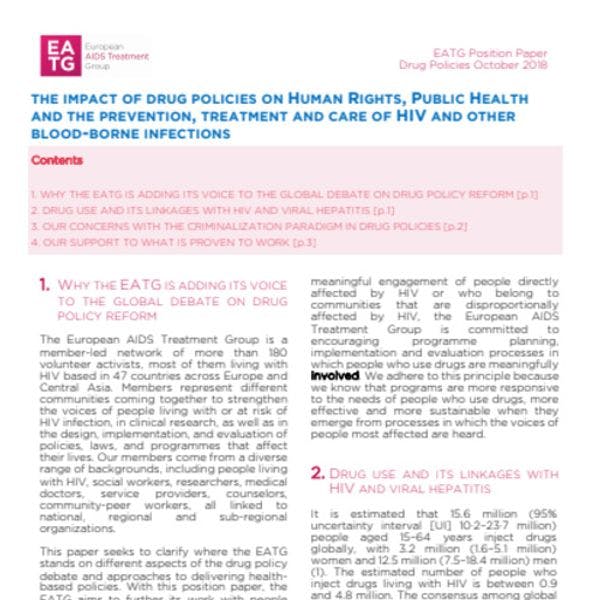The impact of drug policies on human rights, public health and the prevention, treatment and care of HIV and other blood-borne infections
By The European AIDS Treatment Group
The European AIDS Treatment Group is a member-led network of more than 180 volunteer activists, most of them living with HIV based in 47 countries across Europe and Central Asia. Members represent different communities coming together to strengthen the voices of people living with or at risk of HIV infection, in clinical research, as well as in the design, implementation, and evaluation of policies, laws, and programmes that affect their lives. Our members come from a diverse range of backgrounds, including people living with HIV, social workers, researchers, medical doctors, service providers, counselors, community-peer workers, all linked to national, regional and sub-regional organizations.
This paper seeks to clarify where the EATG stands on different aspects of the drug policy debate and approaches to delivering healthbased policies. With this position paper, the EATG aims to further its work with people using drugs and advocacy for a syndemic approach in improving health outcomes and maximize its contribution to drug policy discussions in Europe and beyond, in particular, that within the Civil Society Forum on drugs of which it is a member. As one of the crucial lessons from the response to HIV and AIDS is that the 1 Global prevalence of injecting drug use and sociodemographic characteristics and prevalence of HIV, HBV, and HCV in people who inject drugs: a multistage meaningful engagement of people directly affected by HIV or who belong to communities that are disproportionally affected by HIV, the European AIDS Treatment Group is committed to encouraging programme planning, implementation and evaluation processes in which people who use drugs are meaningfully involved. We adhere to this principle because we know that programs are more responsive to the needs of people who use drugs, more effective and more sustainable when they emerge from processes in which the voices of people most affected are heard.
